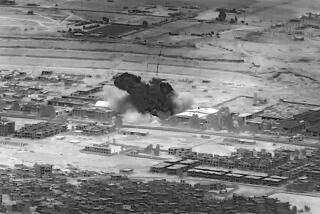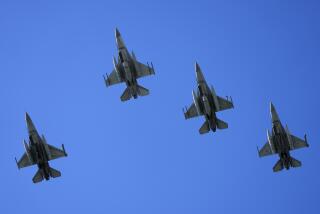Clinton Ready to OK Bosnia Raids : Balkans: U.N. secretary general says he will authorize requests for U.S. air strikes to protect peacekeepers. President says he is also willing to act to save Sarajevo.
- Share via
WASHINGTON — President Clinton said Wednesday that he is ready to order American air strikes against Serbian forces in Bosnia-Herzegovina, if the United Nations requests action to protect its troops there, and U.N. Secretary General Boutros Boutros-Ghali said he will authorize such requests beginning next week.
“We are prepared to move, if we are asked to provide that assistance by the secretary general,” Clinton told reporters at the White House. “Will it be enough to deter aggression, to stop the shelling of Sarajevo, to bring the parties to the peace table? I don’t know.”
The use of American warplanes or helicopters against Serbs would be the first direct U.S. military intervention in the 15-month Bosnian war. As now envisioned, however, it would be limited to protecting U.N. ground troops--not the thousands of civilians who have come under artillery and sniper fire nearly every day.
But Clinton and his aides also are actively considering a wider use of American air power--to protect Bosnian civilians and humanitarian aid supply lines against shelling by Serbian and Croatian militias, a senior Administration official said.
“The President is most concerned about the civilian population of Sarajevo and he is looking for a way to address that problem,” the official said.
Clinton has asked Britain, France and other countries with troops on the ground in Bosnia to consider joint military action to protect the republic’s capital, he said.
“I’m very upset by the shelling in Sarajevo,” Clinton told reporters. Later, he noted: “Of course, if we have to take any action, I will have appropriate consultations with Congress and appropriate conversations with the American people.”
For more than four months, Clinton has publicly offered American air power to protect U.N. troops in Bosnia as part of a U.S.-backed effort to establish safe areas for civilians in Sarajevo and five other Bosnian cities.
Until now, Administration officials had insisted that American air power could be used only to protect U.N. troops in Bosnia and warned that any wider use risked entangling the United States more deeply in the war.
But reports of Serbian military advances toward Sarajevo--and searing television images of suffering civilians--prompted Clinton, Vice President Al Gore and Secretary of State Warren Christopher to reopen the issue earlier this month, officials said.
A Serbian artillery attack on French members of the U.N. force in Sarajevo on Sunday prompted the French government to demand activation of the air squadron that America had promised.
French Defense Minister Francois Leotard visited Boutros-Ghali in New York and asked him to authorize air operations as soon as possible. Boutros-Ghali’s approval is needed because the entire peacekeeping operation in Bosnia is under U.N. authority.
“A decision will be made on Monday or Tuesday,” Boutros-Ghali told reporters at U.N. headquarters. He said he must consult the Security Council and the head of U.N. forces in the former Yugoslav republics, French Gen. Jean Cot. But Boutros-Ghali said he plans to issue a blanket authorization, after which air strikes could be requested by commanders in the field. “This could be done automatically,” he said.
He added that he envisioned air strikes “limited to the place which has violated the rules of the United Nations” and only in response to future attacks--not in retaliation against Sunday’s attack on the French.
Boutros-Ghali and other officials said the main reason for the delay in authorizing air strikes has been the U.N.’s inability to deploy “forward air controllers” on the ground in Bosnia to direct air strikes accurately.
But they said the U.N. forces expect to get initial spotter detachments in place by the beginning of the week, directed by a new air operations control center at Kiseljak, west of Sarajevo. The units would include only European troops, not Americans, because Clinton has ruled out any U.S. military involvement on the ground.
Administration officials acknowledged that, if the air strikes are limited to protecting U.N. troops, they are unlikely to have a major impact on the course of the war, in which Serbian and Croatian militias have conquered more than 70% of Bosnia’s territory.
“They might make them pause,” one official said, a bit wistfully. He noted that previous threats of American air strikes had caused Serbia and the Bosnian Serbs to moderate their demands temporarily. Even a limited use of air power might help produce a compromise at the Bosnian factions’ peace talks in Geneva, which started Tuesday, he said.
If U.N. commanders do request air strikes, they will have a huge fleet of warplanes and helicopters to call on. Pentagon officials said the North Atlantic Treaty Organization has assembled a force of more than 130 aircraft available for immediate use. The squadron includes some 60 high-speed jet fighters--F-15s, F-16s, Mirage 2000s and Tornados--from the United States, France, Britain, the Netherlands and Turkey.
It also includes slower, lower-flying planes that may, nevertheless, be more effective under some circumstances: four U.S. AC-130H Spectre gunships with precision-guided cannons. The United States recently used four AC-130H gunships in Mogadishu to destroy weapons and storage areas belonging to Somali warlord Mohammed Farah Aidid. Officials said the crafts’ firepower is enormous, and they are particularly effective against artillery fire and ground weapons.
The land-based aircraft are in place at several allied air bases in Italy, across the Adriatic Sea from Bosnia, officials said.
The U.S. aircraft carrier Theodore Roosevelt also is in the Adriatic with 12 A-10 attack planes, helicopters that can be used for spotting and more than two dozen F/A-18 Navy and Marine Corps attack fighters.
Western military officials said the issue of forward air controllers is crucial because the spotters enable aircraft to strike targets with precision.
Some Pentagon planners fear that the Serbs might try to lure NATO warplanes into a situation where air strikes would risk hitting civilians. Officials said Serbian militiamen already have hidden tanks and artillery in and around hospitals and other civilian buildings.
Allied intelligence on the ground is also not as good as military planners would like and probably cannot be strengthened significantly without placing more ground troops in the country, officials said.
Times staff writer Art Pine contributed to this report.
More to Read
Sign up for Essential California
The most important California stories and recommendations in your inbox every morning.
You may occasionally receive promotional content from the Los Angeles Times.













